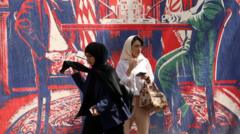The US has initiated a proposal for a fresh nuclear agreement with Iran, as confirmed by the White House on Saturday. During a visit by Oman's Foreign Minister Badr Albusaidi to Tehran, Iranian officials were presented with key elements of the US proposal. This development comes in the wake of a troubling report from the UN's nuclear watchdog indicating that Iran has ramped up its production of enriched uranium, vital for potential nuclear weaponry.
**US Proposes New Nuclear Deal to Iran Amidst Rising Tensions**

**US Proposes New Nuclear Deal to Iran Amidst Rising Tensions**
The White House has confirmed a new nuclear deal proposal has been sent to Iran, sparking significant diplomatic discussions following the IAEA's alarming report on Iran's enriched uranium production.
White House press secretary Karoline Leavitt stated the proposal, delivered by President Trump's special envoy, Steve Witkoff, is in Iran's "best interest" to accept, emphasizing Trump's commitment to preventing Iran from developing atomic bombs. Iranian Foreign Minister Abbas Araghchi indicated that Iran would respond to the proposal according to its national interests and rights, though specific details of the offer remain undisclosed.
The backdrop of this diplomatic effort is a recent International Atomic Energy Agency (IAEA) report finding that Iran has amassed over 400kg of uranium enriched to 60% purity—a significant level closer to weapons-grade standards, which require 90% purity. This quantity is considered sufficient for potentially creating around ten nuclear weapons if further refined.
The United States has long sought to curtail Iran's nuclear capabilities and has been engaged in talks mediated by Oman since April. Although there has been cautious optimism, crucial disagreements remain, particularly regarding Iran's future enrichment activities. The IAEA has documented that Iran's enrichment pace could facilitate the production of weapons-grade material in less than two weeks, reviving concerns about Tehran's nuclear intentions.
Iran, claiming its nuclear program is strictly for peaceful purposes, has faced skepticism due to its lack of transparency regarding its nuclear activities and history. This new proposal follows Trump's controversial withdrawal from the original Joint Comprehensive Plan of Action (JCPOA) in 2018, which had aimed to regulate Iran's nuclear endeavors in exchange for sanction relief. Trump has since reinstated severe sanctions and warned of military action if diplomatic efforts fail to lead to an acceptable agreement.
As global powers watch this situation evolve, the complexities of Iran's nuclear ambitions juxtaposed with US diplomatic efforts continue to pose challenges for international relations.
The backdrop of this diplomatic effort is a recent International Atomic Energy Agency (IAEA) report finding that Iran has amassed over 400kg of uranium enriched to 60% purity—a significant level closer to weapons-grade standards, which require 90% purity. This quantity is considered sufficient for potentially creating around ten nuclear weapons if further refined.
The United States has long sought to curtail Iran's nuclear capabilities and has been engaged in talks mediated by Oman since April. Although there has been cautious optimism, crucial disagreements remain, particularly regarding Iran's future enrichment activities. The IAEA has documented that Iran's enrichment pace could facilitate the production of weapons-grade material in less than two weeks, reviving concerns about Tehran's nuclear intentions.
Iran, claiming its nuclear program is strictly for peaceful purposes, has faced skepticism due to its lack of transparency regarding its nuclear activities and history. This new proposal follows Trump's controversial withdrawal from the original Joint Comprehensive Plan of Action (JCPOA) in 2018, which had aimed to regulate Iran's nuclear endeavors in exchange for sanction relief. Trump has since reinstated severe sanctions and warned of military action if diplomatic efforts fail to lead to an acceptable agreement.
As global powers watch this situation evolve, the complexities of Iran's nuclear ambitions juxtaposed with US diplomatic efforts continue to pose challenges for international relations.




















